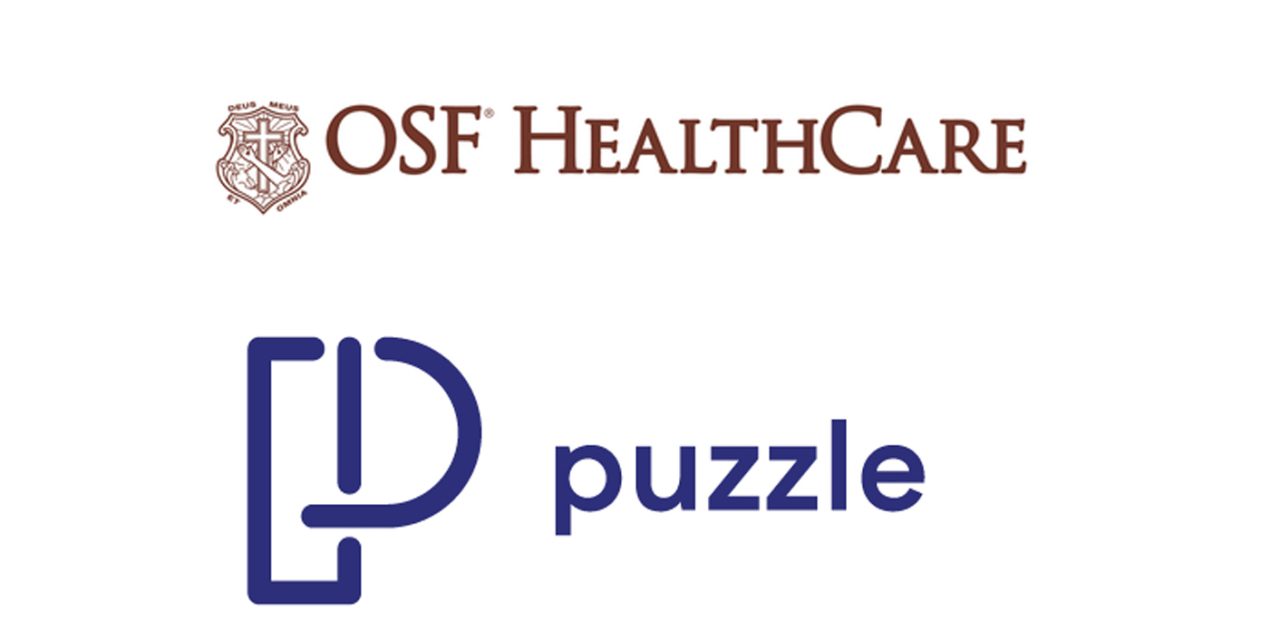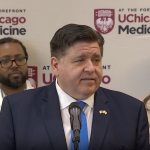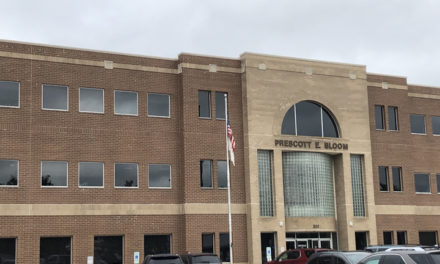
OSF, Puzzle Healthcare collaborate to improve post-acute care

After years of having their own skilled nursing facility practices, OSF HealthCare’s Director of Skilled Nursing Facilities Matt Nieukirk said they realized they needed to do more to address the quality of post-acute care.
So the health system connected with Detroit-based Puzzle Healthcare, which is focused on post-acute readmission prevention and ensuring patients “have providers rounding on them and really making sure they don’t bounce back to the hospital,” Nieukirk said.
Puzzle’s programs include embedding physiatrists in skilled nursing facilities to provide specialized care and ensure interventions for at-risk residents are effective. The company also develops readmission avoidance pathways, triaging patients to the appropriate care setting to further reduce the risk of readmission.
Health News Illinois caught up with Nieukirk and Dr. Ahzam Afzal, CEO and co-founder of Puzzle Healthcare, about the partnership, the challenges facing post-acute care and the latter’s plans for future expansion in Illinois.
Edited excerpts below:
HNI: How did the partnership between your two organizations start?
Nieukirk: For the past 10 to 12 years, OSF has had their own (skilled nursing facility) practice, where they had (advanced practice nurses) and physicians actually rounding in nursing homes. The goal of having their own staff in those facilities was to be accountable for readmissions. For patients going out to the skilled facilities, we would have our own providers rounding on them and really try and prevent them from bouncing back to the hospital. About a year to year and a half ago, we started realizing that we didn’t have enough accountability in enough nursing homes that we were actually discharging patients to. We were discharging patients to anywhere between 75 to 80 facilities across our entire ministry, the 18 hospitals that we own. I was introduced to Dr. Afzal and Puzzle about a year and a half ago, and we went back to the health system and basically said, ‘I think for us to really have an impact on the readmissions, we need to have a bigger footprint. We need to be impacting more patients that are in skilled facilities.’ (Puzzle is) actually able to follow in all of those facilities that we really need for our patients to have providers rounding on them and really making sure they don’t bounce back to the hospital.
Afzal: We recognize that post-acute care settings play a pretty important role in preventing hospital readmissions and improving overall quality of care. We thought that it would be a good synergistic partnership … From our perspective, we are always looking to ensure that patient outcomes are superior, but we’re also trying to find ways to enhance the patient experience when the patients leave the hospital. So these health systems, they get all these penalties and sometimes they don’t have the resources to actually follow through on the care once they leave the hospital. And the sickest of the sick, the sickest patients, are generally the ones that are going into the skilled nursing facilities … That’s where sometimes the health systems are kind of blind in terms of what insights or visibility they have on the patients once they leave the hospital …
We work very closely with OSF and engage their post-acute partners. What we end up doing is we will work collaboratively with them, and the health systems are reaching out to their skilled nursing facility partners and saying, ‘Hey, we’re launching a readmission prevention initiative, and we’d like for you to really collaborate with us on this initiative.’ The (skilled nursing facilities) are very receptive because they want to ensure that the quality outcomes for their patients are also at a high level. But then also, they want to keep their referral sources happy because they’re getting patients from the health systems.
HNI: What are some of the existing challenges in this space? And how do Puzzle and OSF work to address them?
Nieukirk: These patients want to go home. We sit them in the hospital, we sit down with a physician, we sit them down with a case manager and say, ‘You need to go to a skilled facility because you need daily therapy,’ or, ‘You need a little bit more care than what you’re going to get at home.’ One thing that we’ve really been talking about, especially more recently, is those patients who really belong in a skilled facility are saying, ‘No, I am going home.’ I think our biggest challenge from the health system is trying to get the patient to the right level of care so that they can be successful down the road. As the baby boomers get older, and they’re getting into 70s, 80s and even early 90s now, I really think that’s going to be the biggest challenge for health systems in the next five to 10 years: getting those patients to the right level of care.
Afzal: It’s important to start by acknowledging that the post-acute care space faces a lot of interconnected challenges, many of which are tied to communication, data, access and resource limitations. I’ll pinpoint the issue of fragmented communication. When patients are discharged from the hospital, there’s often a lack of real-time data sharing between the acute care team and the post-acute providers. What ends up happening is that important details about the patient’s care plan, medications or potential risk factors aren’t always transmitted in a timely manner. This leads to reactive care, rather than proactive intervention. What we’re doing at Puzzle is addressing this by enhancing real-time communication and data-sharing. Our platform integrates with the existing system so that post-acute providers can stay up to date with the patient’s evolving conditions. The goal is to make sure that all care team members, from the hospital discharge planners to the skilled nursing facility staff to the home health services, once the patient leaves the facility, are all on the same page.
Another challenge we see is the lack of real-time patient monitoring after discharge. Once patients leave the hospital, especially in settings like skilled nursing facilities, there’s a risk that their condition might deteriorate without anyone noticing until it’s too late, resulting in an avoidable readmission. To tackle that, we’ve integrated a lot of remote patient monitoring and predictive analytics into our system. That allows us to track key health indicators continuously and alert our care teams at the first sign of deterioration. That way our post-acute providers can really intervene before the situation escalates to the point of hospital readmission.
And then you have to understand that one of the bigger challenges is there are a lot of resource constraints that exist in post-acute settings. Staffing shortages are very real. Many skilled nursing facilities are operating with limited resources, making it very hard for them to provide individualized care, and that could lead to even more delays in addressing early signs of complications. We address this through the automation support tools that will help our care teams prioritize patients who are at the highest risk.
HNI: Who else does Puzzle partner with, specifically in Illinois?
Afzal: We work with some of the top health systems across the country, like Corewell Health, the largest health system in the state of Michigan … But we’re in a bunch of other states, working with some of the key health systems. And OSF was a big target for us, just because, in terms of hospital count, they’re the largest health system in the state of Illinois. Of course, there are other health systems in the state that may have more beds, but from a geographical presence and perspective, OSF made a good, natural fit as the first partner in the Illinois market. We are now looking to collaborate with other health systems as well in the Illinois region. And we’re working closely with a lot of the skilled nursing facilities that are in even the Chicagoland area as well.









